Consumer Behaviour of Automobile Sector: Tesla Motors Consumer Profile
VerifiedAdded on 2023/05/29
|11
|2774
|337
Report
AI Summary
This report provides a comprehensive analysis of consumer behavior within the Tesla automobile sector, focusing on the Canadian market. It begins by establishing consumer profiles, including demographic, geographic, and psychographic characteristics of Tesla buyers. The report then explores the factors influencing brand perception and the motivations behind purchasing a Tesla, including the impact of social media and the role of Maslow's hierarchy of needs. The influence of price hikes in gasoline and the demand for eco-friendly vehicles are also discussed. Finally, the report synthesizes these findings to create a profile of an ideal Tesla consumer, offering insights into their lifestyle and purchasing behaviors. The report concludes by emphasizing the dynamic nature of consumer behavior and the importance of adapting to shifting trends in the market.
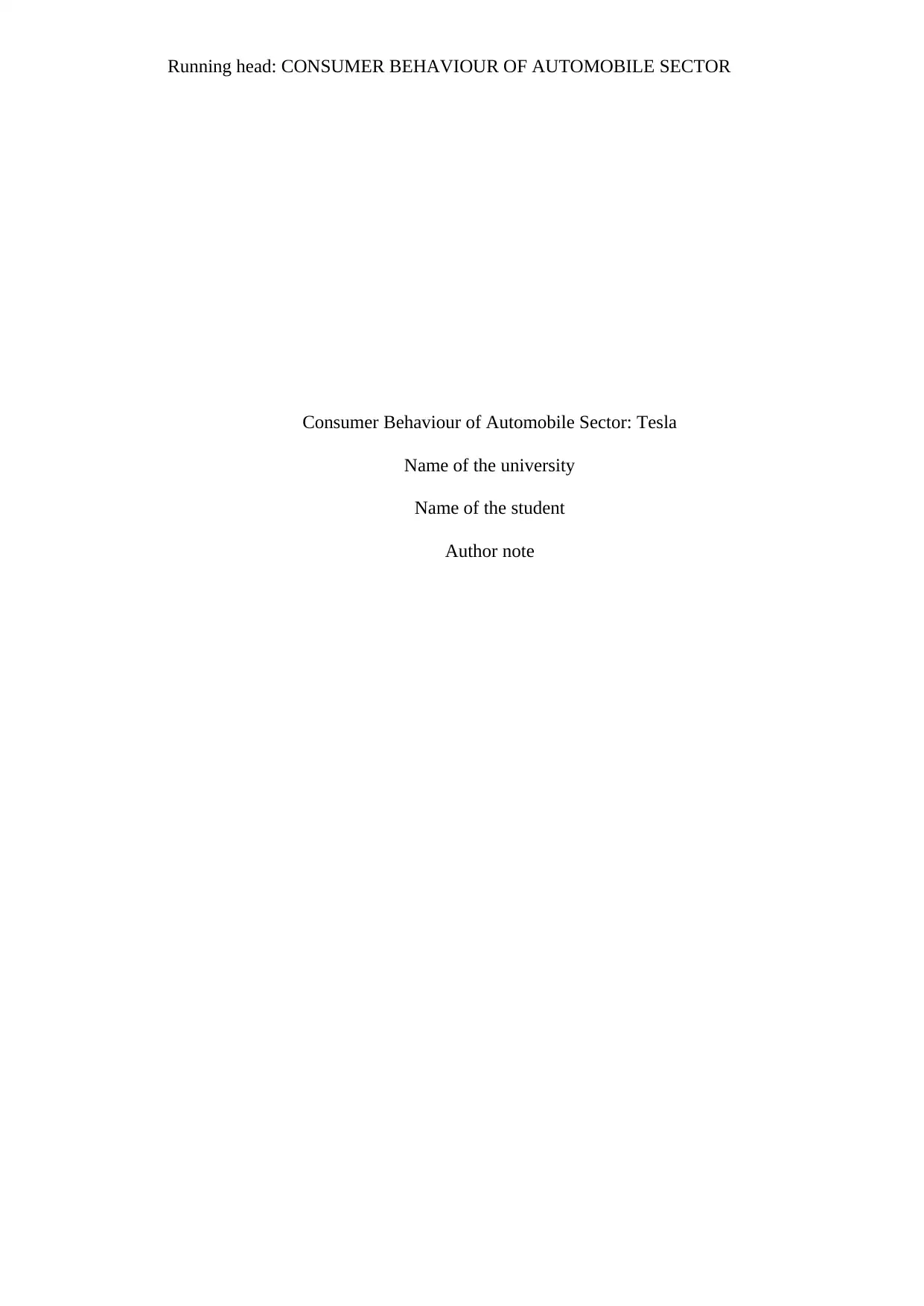
Running head: CONSUMER BEHAVIOUR OF AUTOMOBILE SECTOR
Consumer Behaviour of Automobile Sector: Tesla
Name of the university
Name of the student
Author note
Consumer Behaviour of Automobile Sector: Tesla
Name of the university
Name of the student
Author note
Paraphrase This Document
Need a fresh take? Get an instant paraphrase of this document with our AI Paraphraser
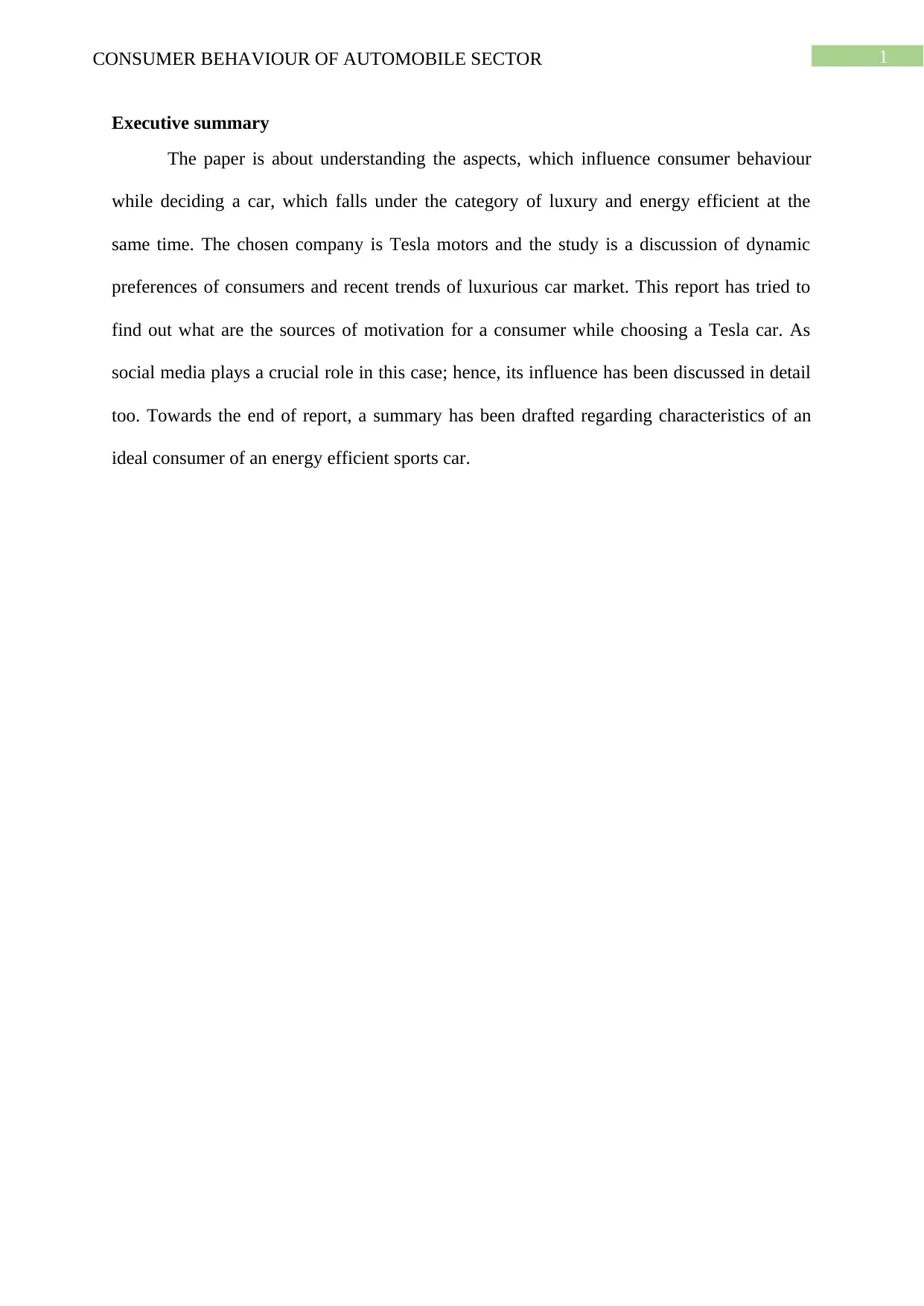
1CONSUMER BEHAVIOUR OF AUTOMOBILE SECTOR
Executive summary
The paper is about understanding the aspects, which influence consumer behaviour
while deciding a car, which falls under the category of luxury and energy efficient at the
same time. The chosen company is Tesla motors and the study is a discussion of dynamic
preferences of consumers and recent trends of luxurious car market. This report has tried to
find out what are the sources of motivation for a consumer while choosing a Tesla car. As
social media plays a crucial role in this case; hence, its influence has been discussed in detail
too. Towards the end of report, a summary has been drafted regarding characteristics of an
ideal consumer of an energy efficient sports car.
Executive summary
The paper is about understanding the aspects, which influence consumer behaviour
while deciding a car, which falls under the category of luxury and energy efficient at the
same time. The chosen company is Tesla motors and the study is a discussion of dynamic
preferences of consumers and recent trends of luxurious car market. This report has tried to
find out what are the sources of motivation for a consumer while choosing a Tesla car. As
social media plays a crucial role in this case; hence, its influence has been discussed in detail
too. Towards the end of report, a summary has been drafted regarding characteristics of an
ideal consumer of an energy efficient sports car.
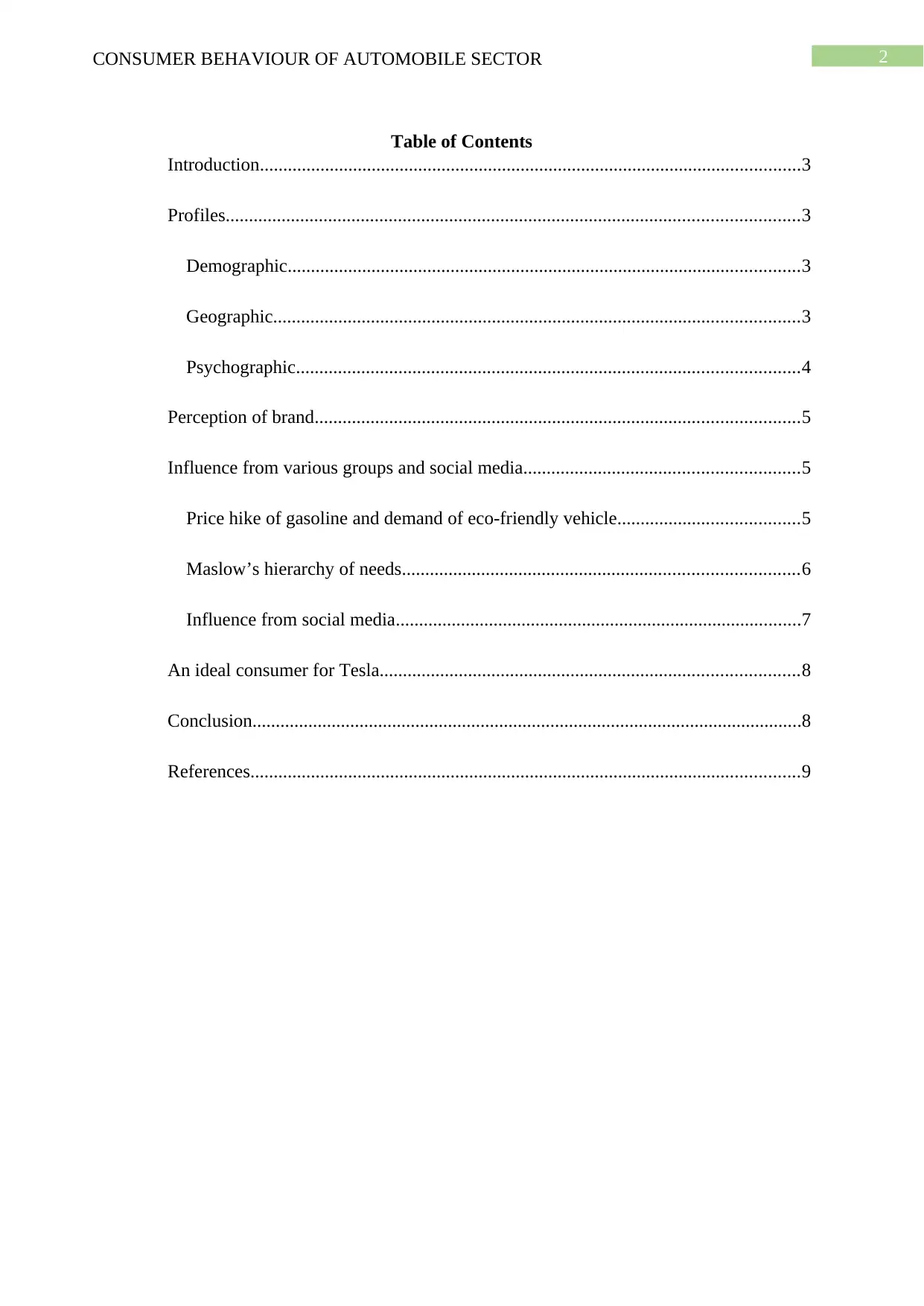
2CONSUMER BEHAVIOUR OF AUTOMOBILE SECTOR
Table of Contents
Introduction....................................................................................................................3
Profiles...........................................................................................................................3
Demographic..............................................................................................................3
Geographic.................................................................................................................3
Psychographic............................................................................................................4
Perception of brand........................................................................................................5
Influence from various groups and social media...........................................................5
Price hike of gasoline and demand of eco-friendly vehicle.......................................5
Maslow’s hierarchy of needs.....................................................................................6
Influence from social media.......................................................................................7
An ideal consumer for Tesla..........................................................................................8
Conclusion......................................................................................................................8
References......................................................................................................................9
Table of Contents
Introduction....................................................................................................................3
Profiles...........................................................................................................................3
Demographic..............................................................................................................3
Geographic.................................................................................................................3
Psychographic............................................................................................................4
Perception of brand........................................................................................................5
Influence from various groups and social media...........................................................5
Price hike of gasoline and demand of eco-friendly vehicle.......................................5
Maslow’s hierarchy of needs.....................................................................................6
Influence from social media.......................................................................................7
An ideal consumer for Tesla..........................................................................................8
Conclusion......................................................................................................................8
References......................................................................................................................9
⊘ This is a preview!⊘
Do you want full access?
Subscribe today to unlock all pages.

Trusted by 1+ million students worldwide
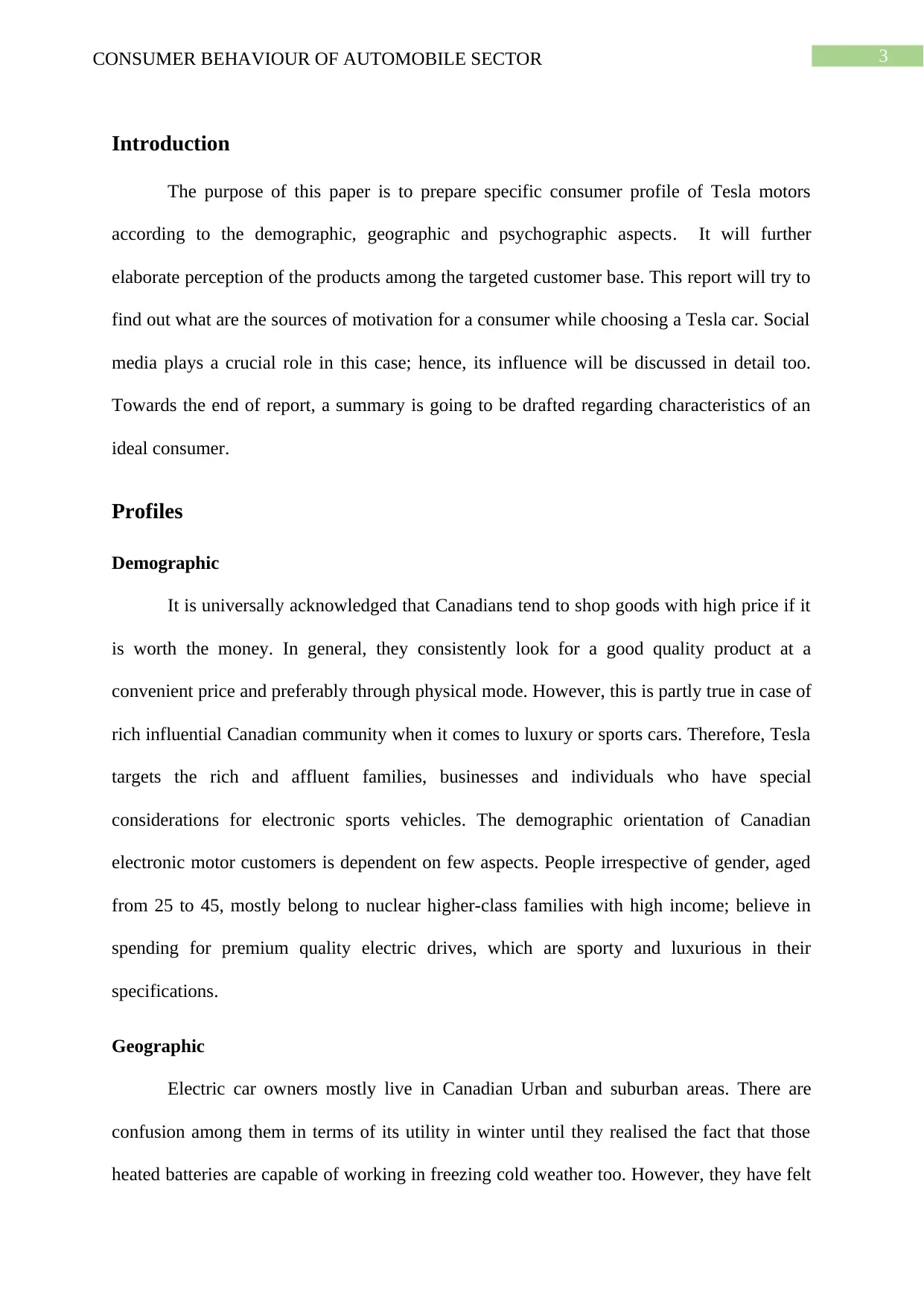
3CONSUMER BEHAVIOUR OF AUTOMOBILE SECTOR
Introduction
The purpose of this paper is to prepare specific consumer profile of Tesla motors
according to the demographic, geographic and psychographic aspects. It will further
elaborate perception of the products among the targeted customer base. This report will try to
find out what are the sources of motivation for a consumer while choosing a Tesla car. Social
media plays a crucial role in this case; hence, its influence will be discussed in detail too.
Towards the end of report, a summary is going to be drafted regarding characteristics of an
ideal consumer.
Profiles
Demographic
It is universally acknowledged that Canadians tend to shop goods with high price if it
is worth the money. In general, they consistently look for a good quality product at a
convenient price and preferably through physical mode. However, this is partly true in case of
rich influential Canadian community when it comes to luxury or sports cars. Therefore, Tesla
targets the rich and affluent families, businesses and individuals who have special
considerations for electronic sports vehicles. The demographic orientation of Canadian
electronic motor customers is dependent on few aspects. People irrespective of gender, aged
from 25 to 45, mostly belong to nuclear higher-class families with high income; believe in
spending for premium quality electric drives, which are sporty and luxurious in their
specifications.
Geographic
Electric car owners mostly live in Canadian Urban and suburban areas. There are
confusion among them in terms of its utility in winter until they realised the fact that those
heated batteries are capable of working in freezing cold weather too. However, they have felt
Introduction
The purpose of this paper is to prepare specific consumer profile of Tesla motors
according to the demographic, geographic and psychographic aspects. It will further
elaborate perception of the products among the targeted customer base. This report will try to
find out what are the sources of motivation for a consumer while choosing a Tesla car. Social
media plays a crucial role in this case; hence, its influence will be discussed in detail too.
Towards the end of report, a summary is going to be drafted regarding characteristics of an
ideal consumer.
Profiles
Demographic
It is universally acknowledged that Canadians tend to shop goods with high price if it
is worth the money. In general, they consistently look for a good quality product at a
convenient price and preferably through physical mode. However, this is partly true in case of
rich influential Canadian community when it comes to luxury or sports cars. Therefore, Tesla
targets the rich and affluent families, businesses and individuals who have special
considerations for electronic sports vehicles. The demographic orientation of Canadian
electronic motor customers is dependent on few aspects. People irrespective of gender, aged
from 25 to 45, mostly belong to nuclear higher-class families with high income; believe in
spending for premium quality electric drives, which are sporty and luxurious in their
specifications.
Geographic
Electric car owners mostly live in Canadian Urban and suburban areas. There are
confusion among them in terms of its utility in winter until they realised the fact that those
heated batteries are capable of working in freezing cold weather too. However, they have felt
Paraphrase This Document
Need a fresh take? Get an instant paraphrase of this document with our AI Paraphraser
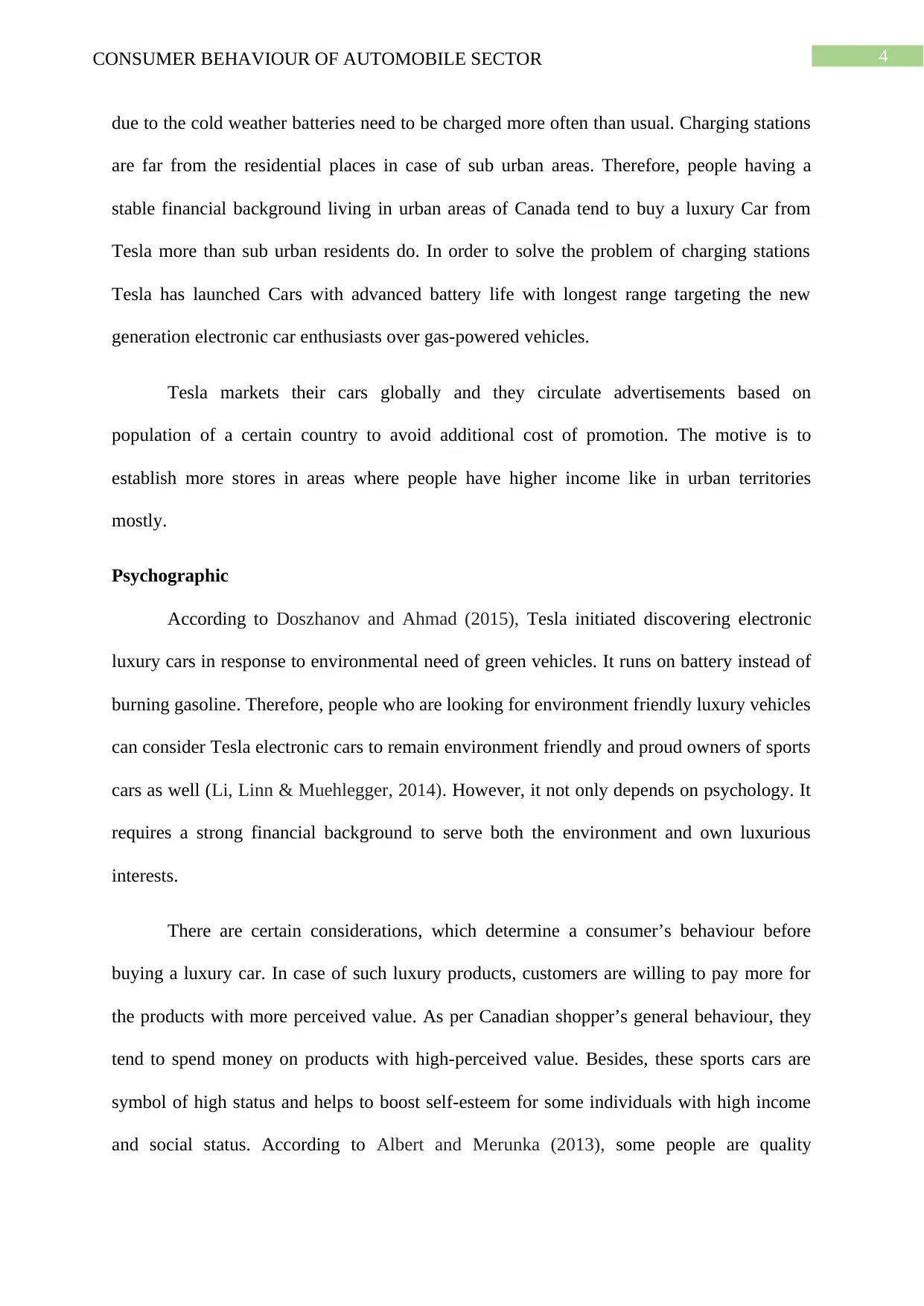
4CONSUMER BEHAVIOUR OF AUTOMOBILE SECTOR
due to the cold weather batteries need to be charged more often than usual. Charging stations
are far from the residential places in case of sub urban areas. Therefore, people having a
stable financial background living in urban areas of Canada tend to buy a luxury Car from
Tesla more than sub urban residents do. In order to solve the problem of charging stations
Tesla has launched Cars with advanced battery life with longest range targeting the new
generation electronic car enthusiasts over gas-powered vehicles.
Tesla markets their cars globally and they circulate advertisements based on
population of a certain country to avoid additional cost of promotion. The motive is to
establish more stores in areas where people have higher income like in urban territories
mostly.
Psychographic
According to Doszhanov and Ahmad (2015), Tesla initiated discovering electronic
luxury cars in response to environmental need of green vehicles. It runs on battery instead of
burning gasoline. Therefore, people who are looking for environment friendly luxury vehicles
can consider Tesla electronic cars to remain environment friendly and proud owners of sports
cars as well (Li, Linn & Muehlegger, 2014). However, it not only depends on psychology. It
requires a strong financial background to serve both the environment and own luxurious
interests.
There are certain considerations, which determine a consumer’s behaviour before
buying a luxury car. In case of such luxury products, customers are willing to pay more for
the products with more perceived value. As per Canadian shopper’s general behaviour, they
tend to spend money on products with high-perceived value. Besides, these sports cars are
symbol of high status and helps to boost self-esteem for some individuals with high income
and social status. According to Albert and Merunka (2013), some people are quality
due to the cold weather batteries need to be charged more often than usual. Charging stations
are far from the residential places in case of sub urban areas. Therefore, people having a
stable financial background living in urban areas of Canada tend to buy a luxury Car from
Tesla more than sub urban residents do. In order to solve the problem of charging stations
Tesla has launched Cars with advanced battery life with longest range targeting the new
generation electronic car enthusiasts over gas-powered vehicles.
Tesla markets their cars globally and they circulate advertisements based on
population of a certain country to avoid additional cost of promotion. The motive is to
establish more stores in areas where people have higher income like in urban territories
mostly.
Psychographic
According to Doszhanov and Ahmad (2015), Tesla initiated discovering electronic
luxury cars in response to environmental need of green vehicles. It runs on battery instead of
burning gasoline. Therefore, people who are looking for environment friendly luxury vehicles
can consider Tesla electronic cars to remain environment friendly and proud owners of sports
cars as well (Li, Linn & Muehlegger, 2014). However, it not only depends on psychology. It
requires a strong financial background to serve both the environment and own luxurious
interests.
There are certain considerations, which determine a consumer’s behaviour before
buying a luxury car. In case of such luxury products, customers are willing to pay more for
the products with more perceived value. As per Canadian shopper’s general behaviour, they
tend to spend money on products with high-perceived value. Besides, these sports cars are
symbol of high status and helps to boost self-esteem for some individuals with high income
and social status. According to Albert and Merunka (2013), some people are quality
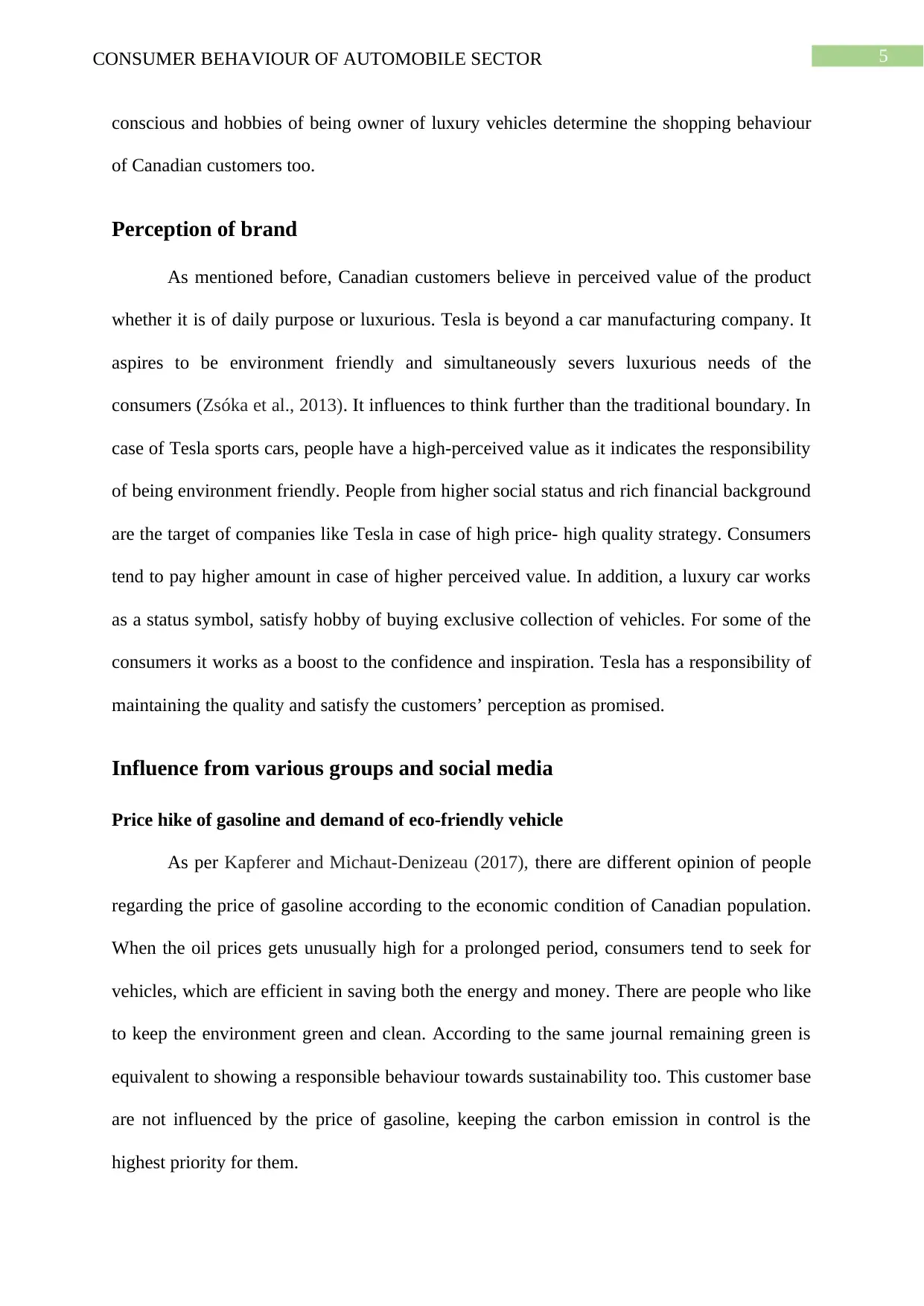
5CONSUMER BEHAVIOUR OF AUTOMOBILE SECTOR
conscious and hobbies of being owner of luxury vehicles determine the shopping behaviour
of Canadian customers too.
Perception of brand
As mentioned before, Canadian customers believe in perceived value of the product
whether it is of daily purpose or luxurious. Tesla is beyond a car manufacturing company. It
aspires to be environment friendly and simultaneously severs luxurious needs of the
consumers (Zsóka et al., 2013). It influences to think further than the traditional boundary. In
case of Tesla sports cars, people have a high-perceived value as it indicates the responsibility
of being environment friendly. People from higher social status and rich financial background
are the target of companies like Tesla in case of high price- high quality strategy. Consumers
tend to pay higher amount in case of higher perceived value. In addition, a luxury car works
as a status symbol, satisfy hobby of buying exclusive collection of vehicles. For some of the
consumers it works as a boost to the confidence and inspiration. Tesla has a responsibility of
maintaining the quality and satisfy the customers’ perception as promised.
Influence from various groups and social media
Price hike of gasoline and demand of eco-friendly vehicle
As per Kapferer and Michaut-Denizeau (2017), there are different opinion of people
regarding the price of gasoline according to the economic condition of Canadian population.
When the oil prices gets unusually high for a prolonged period, consumers tend to seek for
vehicles, which are efficient in saving both the energy and money. There are people who like
to keep the environment green and clean. According to the same journal remaining green is
equivalent to showing a responsible behaviour towards sustainability too. This customer base
are not influenced by the price of gasoline, keeping the carbon emission in control is the
highest priority for them.
conscious and hobbies of being owner of luxury vehicles determine the shopping behaviour
of Canadian customers too.
Perception of brand
As mentioned before, Canadian customers believe in perceived value of the product
whether it is of daily purpose or luxurious. Tesla is beyond a car manufacturing company. It
aspires to be environment friendly and simultaneously severs luxurious needs of the
consumers (Zsóka et al., 2013). It influences to think further than the traditional boundary. In
case of Tesla sports cars, people have a high-perceived value as it indicates the responsibility
of being environment friendly. People from higher social status and rich financial background
are the target of companies like Tesla in case of high price- high quality strategy. Consumers
tend to pay higher amount in case of higher perceived value. In addition, a luxury car works
as a status symbol, satisfy hobby of buying exclusive collection of vehicles. For some of the
consumers it works as a boost to the confidence and inspiration. Tesla has a responsibility of
maintaining the quality and satisfy the customers’ perception as promised.
Influence from various groups and social media
Price hike of gasoline and demand of eco-friendly vehicle
As per Kapferer and Michaut-Denizeau (2017), there are different opinion of people
regarding the price of gasoline according to the economic condition of Canadian population.
When the oil prices gets unusually high for a prolonged period, consumers tend to seek for
vehicles, which are efficient in saving both the energy and money. There are people who like
to keep the environment green and clean. According to the same journal remaining green is
equivalent to showing a responsible behaviour towards sustainability too. This customer base
are not influenced by the price of gasoline, keeping the carbon emission in control is the
highest priority for them.
⊘ This is a preview!⊘
Do you want full access?
Subscribe today to unlock all pages.

Trusted by 1+ million students worldwide
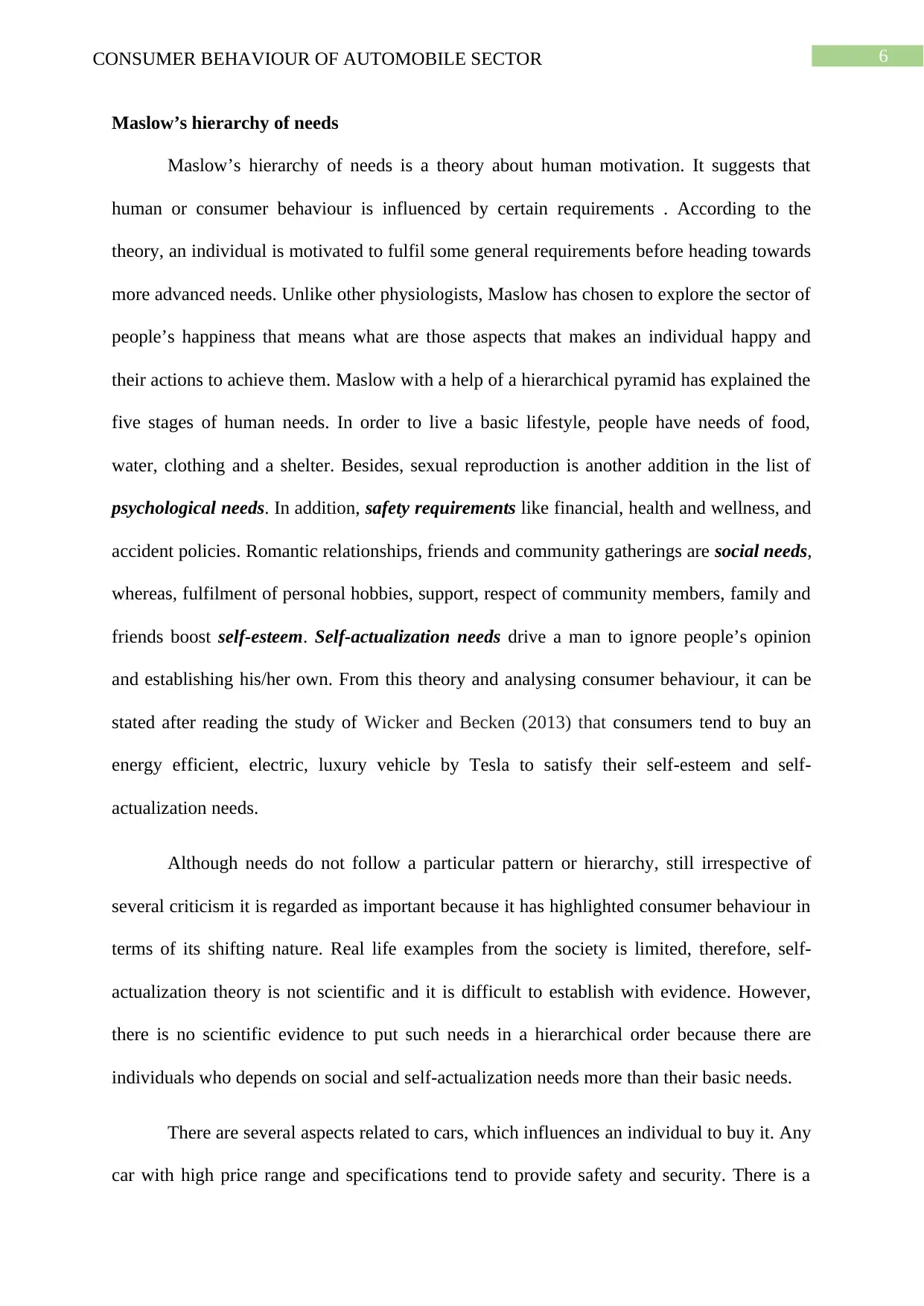
6CONSUMER BEHAVIOUR OF AUTOMOBILE SECTOR
Maslow’s hierarchy of needs
Maslow’s hierarchy of needs is a theory about human motivation. It suggests that
human or consumer behaviour is influenced by certain requirements . According to the
theory, an individual is motivated to fulfil some general requirements before heading towards
more advanced needs. Unlike other physiologists, Maslow has chosen to explore the sector of
people’s happiness that means what are those aspects that makes an individual happy and
their actions to achieve them. Maslow with a help of a hierarchical pyramid has explained the
five stages of human needs. In order to live a basic lifestyle, people have needs of food,
water, clothing and a shelter. Besides, sexual reproduction is another addition in the list of
psychological needs. In addition, safety requirements like financial, health and wellness, and
accident policies. Romantic relationships, friends and community gatherings are social needs,
whereas, fulfilment of personal hobbies, support, respect of community members, family and
friends boost self-esteem. Self-actualization needs drive a man to ignore people’s opinion
and establishing his/her own. From this theory and analysing consumer behaviour, it can be
stated after reading the study of Wicker and Becken (2013) that consumers tend to buy an
energy efficient, electric, luxury vehicle by Tesla to satisfy their self-esteem and self-
actualization needs.
Although needs do not follow a particular pattern or hierarchy, still irrespective of
several criticism it is regarded as important because it has highlighted consumer behaviour in
terms of its shifting nature. Real life examples from the society is limited, therefore, self-
actualization theory is not scientific and it is difficult to establish with evidence. However,
there is no scientific evidence to put such needs in a hierarchical order because there are
individuals who depends on social and self-actualization needs more than their basic needs.
There are several aspects related to cars, which influences an individual to buy it. Any
car with high price range and specifications tend to provide safety and security. There is a
Maslow’s hierarchy of needs
Maslow’s hierarchy of needs is a theory about human motivation. It suggests that
human or consumer behaviour is influenced by certain requirements . According to the
theory, an individual is motivated to fulfil some general requirements before heading towards
more advanced needs. Unlike other physiologists, Maslow has chosen to explore the sector of
people’s happiness that means what are those aspects that makes an individual happy and
their actions to achieve them. Maslow with a help of a hierarchical pyramid has explained the
five stages of human needs. In order to live a basic lifestyle, people have needs of food,
water, clothing and a shelter. Besides, sexual reproduction is another addition in the list of
psychological needs. In addition, safety requirements like financial, health and wellness, and
accident policies. Romantic relationships, friends and community gatherings are social needs,
whereas, fulfilment of personal hobbies, support, respect of community members, family and
friends boost self-esteem. Self-actualization needs drive a man to ignore people’s opinion
and establishing his/her own. From this theory and analysing consumer behaviour, it can be
stated after reading the study of Wicker and Becken (2013) that consumers tend to buy an
energy efficient, electric, luxury vehicle by Tesla to satisfy their self-esteem and self-
actualization needs.
Although needs do not follow a particular pattern or hierarchy, still irrespective of
several criticism it is regarded as important because it has highlighted consumer behaviour in
terms of its shifting nature. Real life examples from the society is limited, therefore, self-
actualization theory is not scientific and it is difficult to establish with evidence. However,
there is no scientific evidence to put such needs in a hierarchical order because there are
individuals who depends on social and self-actualization needs more than their basic needs.
There are several aspects related to cars, which influences an individual to buy it. Any
car with high price range and specifications tend to provide safety and security. There is a
Paraphrase This Document
Need a fresh take? Get an instant paraphrase of this document with our AI Paraphraser
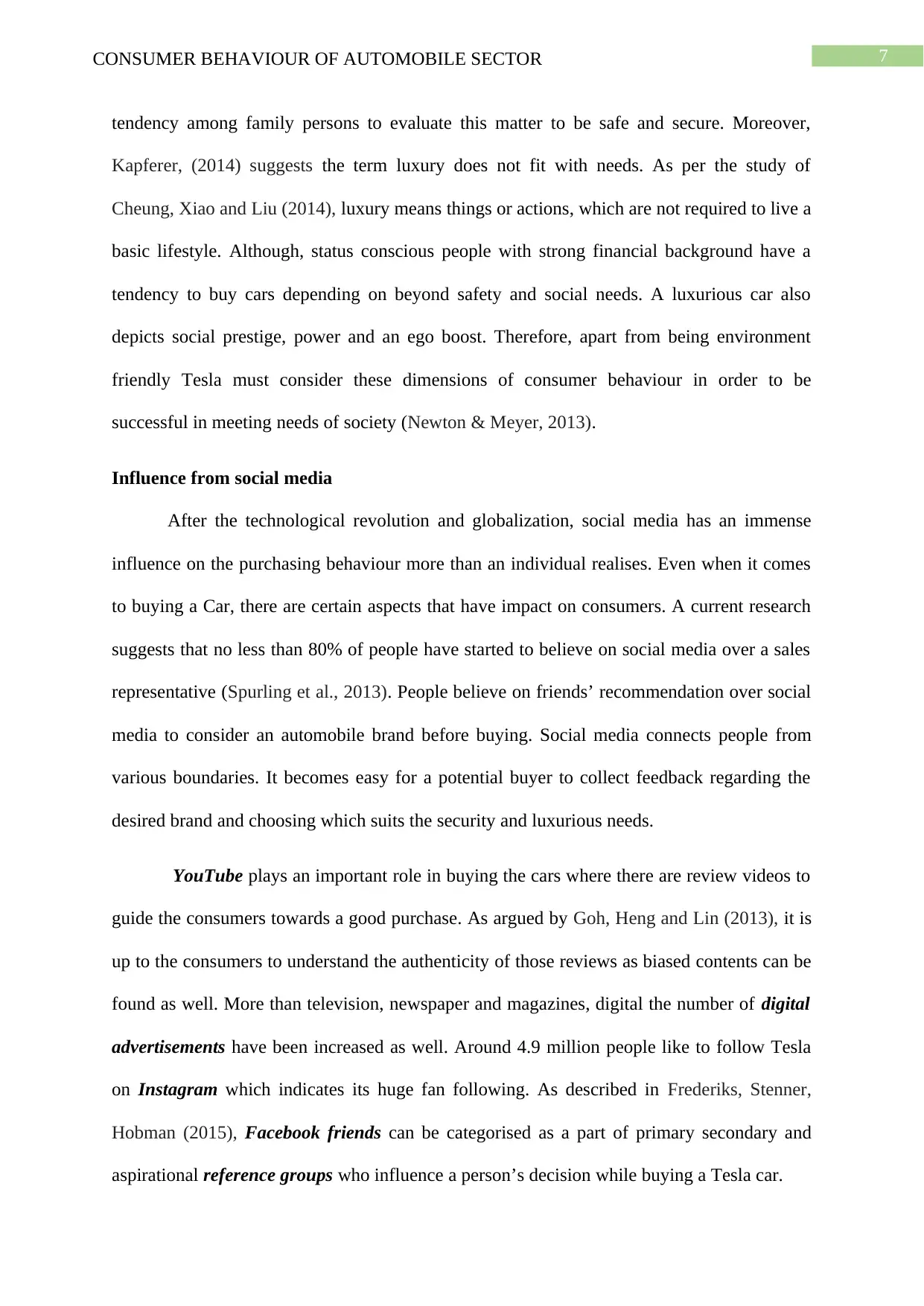
7CONSUMER BEHAVIOUR OF AUTOMOBILE SECTOR
tendency among family persons to evaluate this matter to be safe and secure. Moreover,
Kapferer, (2014) suggests the term luxury does not fit with needs. As per the study of
Cheung, Xiao and Liu (2014), luxury means things or actions, which are not required to live a
basic lifestyle. Although, status conscious people with strong financial background have a
tendency to buy cars depending on beyond safety and social needs. A luxurious car also
depicts social prestige, power and an ego boost. Therefore, apart from being environment
friendly Tesla must consider these dimensions of consumer behaviour in order to be
successful in meeting needs of society (Newton & Meyer, 2013).
Influence from social media
After the technological revolution and globalization, social media has an immense
influence on the purchasing behaviour more than an individual realises. Even when it comes
to buying a Car, there are certain aspects that have impact on consumers. A current research
suggests that no less than 80% of people have started to believe on social media over a sales
representative (Spurling et al., 2013). People believe on friends’ recommendation over social
media to consider an automobile brand before buying. Social media connects people from
various boundaries. It becomes easy for a potential buyer to collect feedback regarding the
desired brand and choosing which suits the security and luxurious needs.
YouTube plays an important role in buying the cars where there are review videos to
guide the consumers towards a good purchase. As argued by Goh, Heng and Lin (2013), it is
up to the consumers to understand the authenticity of those reviews as biased contents can be
found as well. More than television, newspaper and magazines, digital the number of digital
advertisements have been increased as well. Around 4.9 million people like to follow Tesla
on Instagram which indicates its huge fan following. As described in Frederiks, Stenner,
Hobman (2015), Facebook friends can be categorised as a part of primary secondary and
aspirational reference groups who influence a person’s decision while buying a Tesla car.
tendency among family persons to evaluate this matter to be safe and secure. Moreover,
Kapferer, (2014) suggests the term luxury does not fit with needs. As per the study of
Cheung, Xiao and Liu (2014), luxury means things or actions, which are not required to live a
basic lifestyle. Although, status conscious people with strong financial background have a
tendency to buy cars depending on beyond safety and social needs. A luxurious car also
depicts social prestige, power and an ego boost. Therefore, apart from being environment
friendly Tesla must consider these dimensions of consumer behaviour in order to be
successful in meeting needs of society (Newton & Meyer, 2013).
Influence from social media
After the technological revolution and globalization, social media has an immense
influence on the purchasing behaviour more than an individual realises. Even when it comes
to buying a Car, there are certain aspects that have impact on consumers. A current research
suggests that no less than 80% of people have started to believe on social media over a sales
representative (Spurling et al., 2013). People believe on friends’ recommendation over social
media to consider an automobile brand before buying. Social media connects people from
various boundaries. It becomes easy for a potential buyer to collect feedback regarding the
desired brand and choosing which suits the security and luxurious needs.
YouTube plays an important role in buying the cars where there are review videos to
guide the consumers towards a good purchase. As argued by Goh, Heng and Lin (2013), it is
up to the consumers to understand the authenticity of those reviews as biased contents can be
found as well. More than television, newspaper and magazines, digital the number of digital
advertisements have been increased as well. Around 4.9 million people like to follow Tesla
on Instagram which indicates its huge fan following. As described in Frederiks, Stenner,
Hobman (2015), Facebook friends can be categorised as a part of primary secondary and
aspirational reference groups who influence a person’s decision while buying a Tesla car.
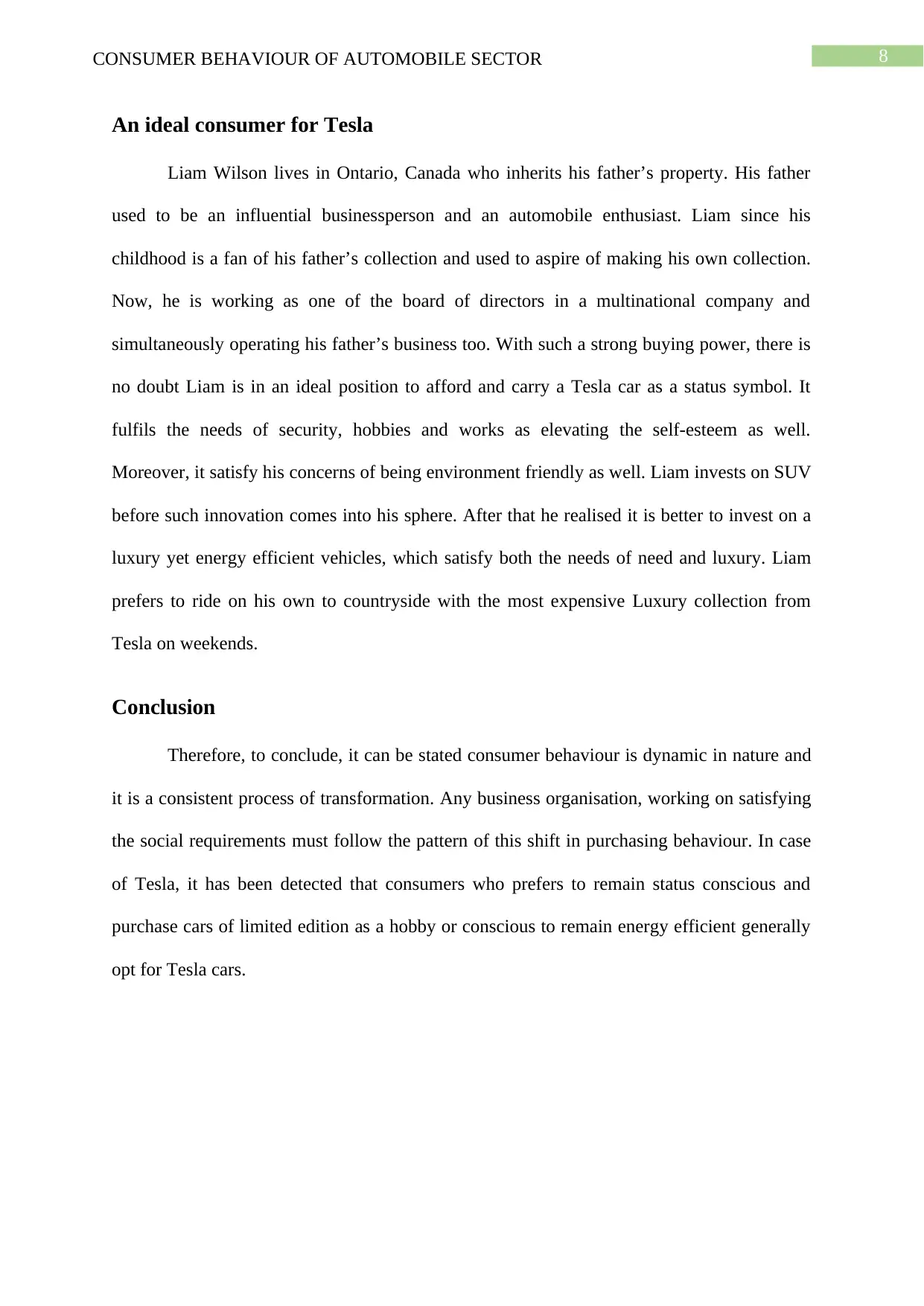
8CONSUMER BEHAVIOUR OF AUTOMOBILE SECTOR
An ideal consumer for Tesla
Liam Wilson lives in Ontario, Canada who inherits his father’s property. His father
used to be an influential businessperson and an automobile enthusiast. Liam since his
childhood is a fan of his father’s collection and used to aspire of making his own collection.
Now, he is working as one of the board of directors in a multinational company and
simultaneously operating his father’s business too. With such a strong buying power, there is
no doubt Liam is in an ideal position to afford and carry a Tesla car as a status symbol. It
fulfils the needs of security, hobbies and works as elevating the self-esteem as well.
Moreover, it satisfy his concerns of being environment friendly as well. Liam invests on SUV
before such innovation comes into his sphere. After that he realised it is better to invest on a
luxury yet energy efficient vehicles, which satisfy both the needs of need and luxury. Liam
prefers to ride on his own to countryside with the most expensive Luxury collection from
Tesla on weekends.
Conclusion
Therefore, to conclude, it can be stated consumer behaviour is dynamic in nature and
it is a consistent process of transformation. Any business organisation, working on satisfying
the social requirements must follow the pattern of this shift in purchasing behaviour. In case
of Tesla, it has been detected that consumers who prefers to remain status conscious and
purchase cars of limited edition as a hobby or conscious to remain energy efficient generally
opt for Tesla cars.
An ideal consumer for Tesla
Liam Wilson lives in Ontario, Canada who inherits his father’s property. His father
used to be an influential businessperson and an automobile enthusiast. Liam since his
childhood is a fan of his father’s collection and used to aspire of making his own collection.
Now, he is working as one of the board of directors in a multinational company and
simultaneously operating his father’s business too. With such a strong buying power, there is
no doubt Liam is in an ideal position to afford and carry a Tesla car as a status symbol. It
fulfils the needs of security, hobbies and works as elevating the self-esteem as well.
Moreover, it satisfy his concerns of being environment friendly as well. Liam invests on SUV
before such innovation comes into his sphere. After that he realised it is better to invest on a
luxury yet energy efficient vehicles, which satisfy both the needs of need and luxury. Liam
prefers to ride on his own to countryside with the most expensive Luxury collection from
Tesla on weekends.
Conclusion
Therefore, to conclude, it can be stated consumer behaviour is dynamic in nature and
it is a consistent process of transformation. Any business organisation, working on satisfying
the social requirements must follow the pattern of this shift in purchasing behaviour. In case
of Tesla, it has been detected that consumers who prefers to remain status conscious and
purchase cars of limited edition as a hobby or conscious to remain energy efficient generally
opt for Tesla cars.
⊘ This is a preview!⊘
Do you want full access?
Subscribe today to unlock all pages.

Trusted by 1+ million students worldwide
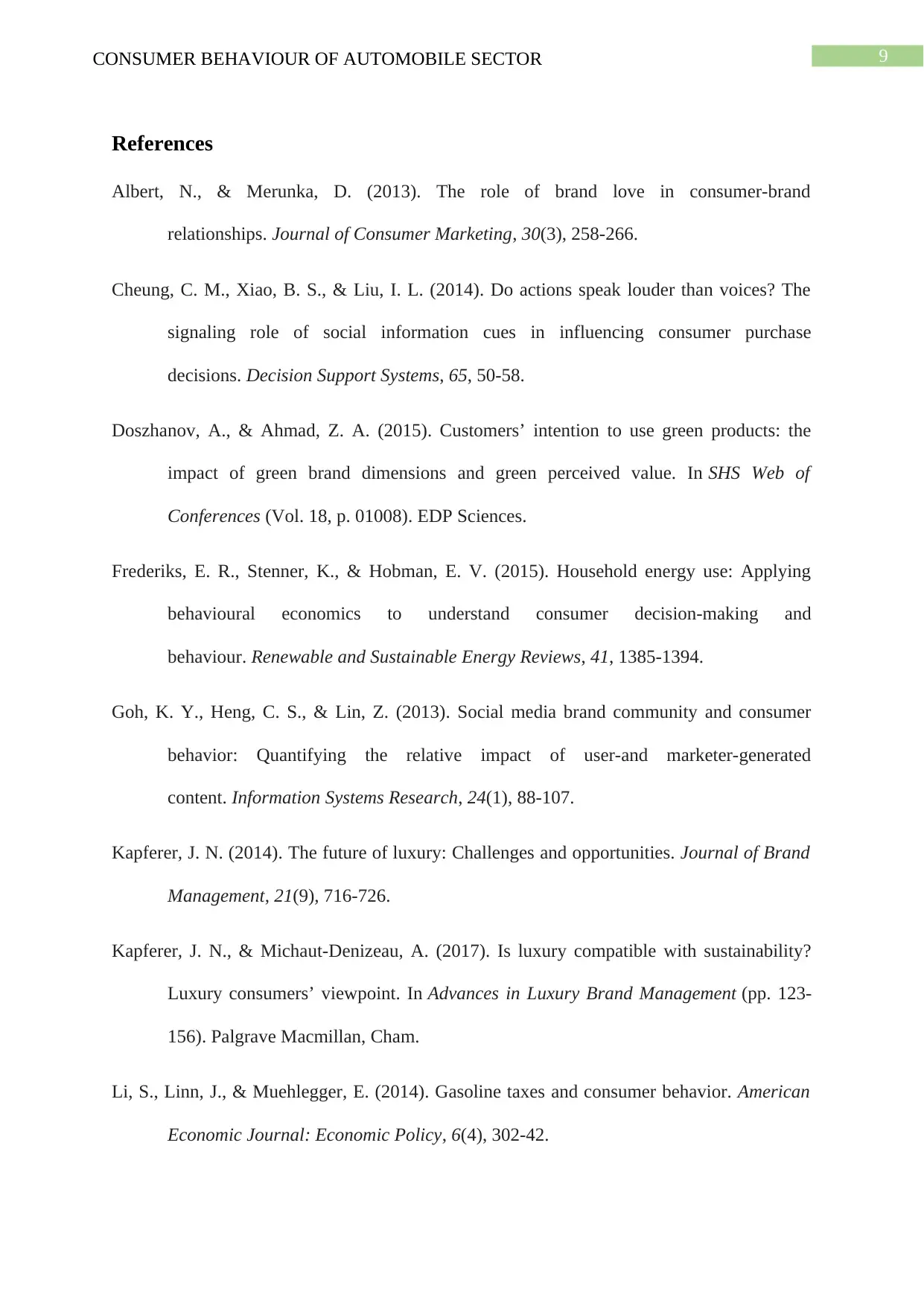
9CONSUMER BEHAVIOUR OF AUTOMOBILE SECTOR
References
Albert, N., & Merunka, D. (2013). The role of brand love in consumer-brand
relationships. Journal of Consumer Marketing, 30(3), 258-266.
Cheung, C. M., Xiao, B. S., & Liu, I. L. (2014). Do actions speak louder than voices? The
signaling role of social information cues in influencing consumer purchase
decisions. Decision Support Systems, 65, 50-58.
Doszhanov, A., & Ahmad, Z. A. (2015). Customers’ intention to use green products: the
impact of green brand dimensions and green perceived value. In SHS Web of
Conferences (Vol. 18, p. 01008). EDP Sciences.
Frederiks, E. R., Stenner, K., & Hobman, E. V. (2015). Household energy use: Applying
behavioural economics to understand consumer decision-making and
behaviour. Renewable and Sustainable Energy Reviews, 41, 1385-1394.
Goh, K. Y., Heng, C. S., & Lin, Z. (2013). Social media brand community and consumer
behavior: Quantifying the relative impact of user-and marketer-generated
content. Information Systems Research, 24(1), 88-107.
Kapferer, J. N. (2014). The future of luxury: Challenges and opportunities. Journal of Brand
Management, 21(9), 716-726.
Kapferer, J. N., & Michaut-Denizeau, A. (2017). Is luxury compatible with sustainability?
Luxury consumers’ viewpoint. In Advances in Luxury Brand Management (pp. 123-
156). Palgrave Macmillan, Cham.
Li, S., Linn, J., & Muehlegger, E. (2014). Gasoline taxes and consumer behavior. American
Economic Journal: Economic Policy, 6(4), 302-42.
References
Albert, N., & Merunka, D. (2013). The role of brand love in consumer-brand
relationships. Journal of Consumer Marketing, 30(3), 258-266.
Cheung, C. M., Xiao, B. S., & Liu, I. L. (2014). Do actions speak louder than voices? The
signaling role of social information cues in influencing consumer purchase
decisions. Decision Support Systems, 65, 50-58.
Doszhanov, A., & Ahmad, Z. A. (2015). Customers’ intention to use green products: the
impact of green brand dimensions and green perceived value. In SHS Web of
Conferences (Vol. 18, p. 01008). EDP Sciences.
Frederiks, E. R., Stenner, K., & Hobman, E. V. (2015). Household energy use: Applying
behavioural economics to understand consumer decision-making and
behaviour. Renewable and Sustainable Energy Reviews, 41, 1385-1394.
Goh, K. Y., Heng, C. S., & Lin, Z. (2013). Social media brand community and consumer
behavior: Quantifying the relative impact of user-and marketer-generated
content. Information Systems Research, 24(1), 88-107.
Kapferer, J. N. (2014). The future of luxury: Challenges and opportunities. Journal of Brand
Management, 21(9), 716-726.
Kapferer, J. N., & Michaut-Denizeau, A. (2017). Is luxury compatible with sustainability?
Luxury consumers’ viewpoint. In Advances in Luxury Brand Management (pp. 123-
156). Palgrave Macmillan, Cham.
Li, S., Linn, J., & Muehlegger, E. (2014). Gasoline taxes and consumer behavior. American
Economic Journal: Economic Policy, 6(4), 302-42.
Paraphrase This Document
Need a fresh take? Get an instant paraphrase of this document with our AI Paraphraser
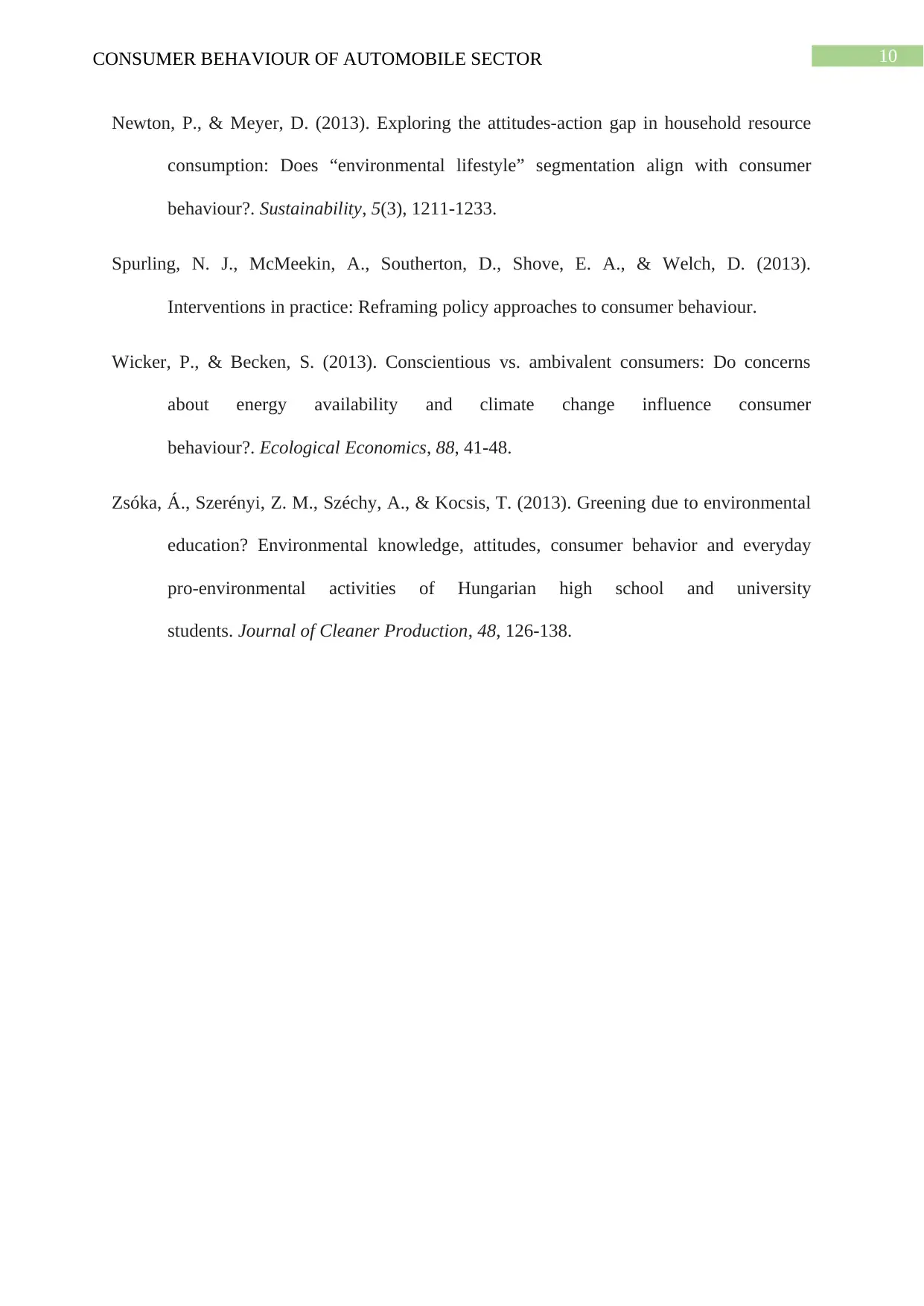
10CONSUMER BEHAVIOUR OF AUTOMOBILE SECTOR
Newton, P., & Meyer, D. (2013). Exploring the attitudes-action gap in household resource
consumption: Does “environmental lifestyle” segmentation align with consumer
behaviour?. Sustainability, 5(3), 1211-1233.
Spurling, N. J., McMeekin, A., Southerton, D., Shove, E. A., & Welch, D. (2013).
Interventions in practice: Reframing policy approaches to consumer behaviour.
Wicker, P., & Becken, S. (2013). Conscientious vs. ambivalent consumers: Do concerns
about energy availability and climate change influence consumer
behaviour?. Ecological Economics, 88, 41-48.
Zsóka, Á., Szerényi, Z. M., Széchy, A., & Kocsis, T. (2013). Greening due to environmental
education? Environmental knowledge, attitudes, consumer behavior and everyday
pro-environmental activities of Hungarian high school and university
students. Journal of Cleaner Production, 48, 126-138.
Newton, P., & Meyer, D. (2013). Exploring the attitudes-action gap in household resource
consumption: Does “environmental lifestyle” segmentation align with consumer
behaviour?. Sustainability, 5(3), 1211-1233.
Spurling, N. J., McMeekin, A., Southerton, D., Shove, E. A., & Welch, D. (2013).
Interventions in practice: Reframing policy approaches to consumer behaviour.
Wicker, P., & Becken, S. (2013). Conscientious vs. ambivalent consumers: Do concerns
about energy availability and climate change influence consumer
behaviour?. Ecological Economics, 88, 41-48.
Zsóka, Á., Szerényi, Z. M., Széchy, A., & Kocsis, T. (2013). Greening due to environmental
education? Environmental knowledge, attitudes, consumer behavior and everyday
pro-environmental activities of Hungarian high school and university
students. Journal of Cleaner Production, 48, 126-138.
1 out of 11
Your All-in-One AI-Powered Toolkit for Academic Success.
+13062052269
info@desklib.com
Available 24*7 on WhatsApp / Email
![[object Object]](/_next/static/media/star-bottom.7253800d.svg)
Unlock your academic potential
Copyright © 2020–2026 A2Z Services. All Rights Reserved. Developed and managed by ZUCOL.